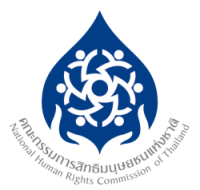The World Health Organization (WHO) announced the outbreak of Covid-19 an international public health emergency and the government of Thailand classified the virus Covid-19 as dangerous disease under the Infectious Disease Act of 2015 as of 26 February 2020, the National Human Rights Commission of Thailand (NHRCT) is; therefore, concerned about the situation of the epidemic since the Constitution of the Kingdom of Thailand and the International Covenant on Economic, Social and Cultural Rights (ICESCR) to which Thailand is party has guaranteed the right to health of people.
In this connection, the NHRCT wishes to express its appreciation and to extend moral support to all parties, especially medical and public health personnel who have fully dedicated themselves to prevent and control the virus from spreading among people. However, the NHRCT would like to give recommendations for the benefit of the disease surveillance, prevention and control including remedial measures as follows:
- The government should develop a national emergency organization with full power for the operation to prevent and control the outbreak of Covid-19. This will lessen the public confusion from receiving information from different government agencies;
- The above-mentioned mechanism should clearly reveal the situation of the epidemic and introduce measures for surveillance, prevention and suppression of the disease outbreak in a precise and coherent manner with full legal enforcement power to strengthen public confidence. The mechanism also should prepare a response plan in case of pandemic. In addition, the information which is communicated to the public should be well-rounded, rapid and easy to get access by taking into account information disparity including physical health. Misinformation and disinformation must be timely corrected to prevent social panic;
- The government should urgently provide availability and supply of essential personal protective equipment (PPE) by giving priority to those who are considered high risks such as medical and public health personnel, people who are being treated or are presumptive for Covid-19. Otherpublic members should get easy access to masks, alcohol and hand sanitizers at fair price. In this regard, the government should use information technologies to help distribute limited resources efficiently, thoroughly and fairly in accordance with the principle of good governance;
- The definitive measures under the law that the government has adopted to solve the current problem with the aim of long-termed public interest can be legitimate. Nevertheless, those measures must take into account the exigencies of the situation, especially the necessity and their proportionality between the magnitude of the risk and the measures taken. The appropriate and timely remedies must be accorded to people who are affected from those measures;
- The government should provide special measures to people with low income, people in rural and remote areas , people with disabilities, the elderly and the prisoners to get access to necessary health protection equipment, health care, surveillance and timely treatment;
- People should carefully consider the received information in order not to forward misinformation to the general public causing fear and misunderstanding. In addition, people and media should not use words or contents to create hatred, discrimination and social stigma on the ground of the association between a person or group of people who share certain characteristics and the Covid-19 disease-related issues. Instead, all parties should unite to cooperate in effective prevention and control of the spread of disease.
The National Human Rights Commission of Thailand (NHRCT) wishes to encourage all sectors to work together on the basis of empathy, compliance with the law and respect for the dignity of each other in order to enable Thailand to overcome this difficult time of crisis.


